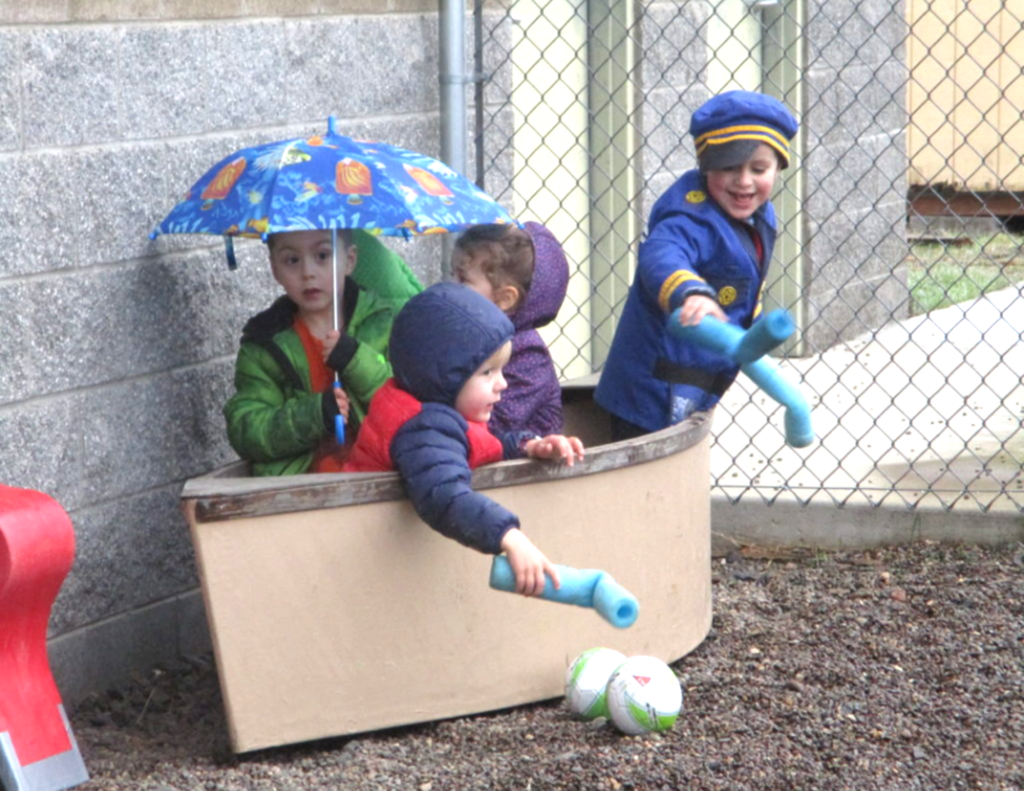Our Mission
At Roots and Wings Community Preschool, our mission is to create a nurturing learning environment that fosters relationships and collaboration between families, children, teachers, and the community. We empower young learners through meaningful play and work, while valuing the contributions of families and weaving research and theory into everyday practice. We embrace diversity and provide equitable access to quality early childhood education, ensuring strong foundations for learning in the early years.

Our Approach
Inquiry Based/Whole Child Approach to Education and Learning
The approach to education and learning that focuses on the whole child recognizes the importance of child development and the process of learning. It prioritizes exploration and discovery rather than memorization and recall. It considers the significance of language acquisition, social-emotional development, gender differences in learning, and the innate drive of young children to learn. In this way, current science and developmental specialists emphasize the importance of childhood as a vital time period for building foundational knowledge.
- Young children are greatly influenced by family and family culture
- Children must be actively (using their whole body) to explore.
- The benefits of active exploration are discovering relationships and connections between people, places, things, and events, learning how to search for answers, and learning how to communicate their discoveries.
- Self-initiative, motivation, and creativity in thought develop through active exploration.
- Action/experience comes before language.
- What hasn’t been held, experienced, or felt will not be perceived as valuable in the developing brain.
- Memorized information (ABC, etc.) although useful will not be perceived as true knowledge until the child reaches the appropriate developmental stage to use it in meaningful ways.
- There are stages of development in all learning areas that move from simple to complex stages, each being as important as the other.
- Rushing without direct consequences to the child can cause low self-esteem and skills built on shaky foundations.
- An inquiry-based curriculum supports children’s innate need to explore and observe phenomena.
- Children must be active participants in their own learning as they build knowledge, one step at a time; sometimes the steps are more like leaps while at other times they are small but steady.
An inquiry-based curriculum is designed to meet the innate needs of children to explore and observe phenomena actively. It encourages children to become active participants in their learning, making connections between their experiences and knowledge. The curriculum should consider all aspects of children’s lives, both inside and outside the classroom, linking different areas of intelligence, such as movement, language, math, science, social, visual arts, and music. The goal of successful preschool education is to produce self-motivated, confident, and knowledgeable communicators. Roots & Wings Community Preschool values the contributions of pioneers in early childhood education and uses their expertise to guide its program.
Our Philosophy
- Acknowledges the uniqueness of each child and their individual approach to learning
- Considers each child’s abilities, family and cultural backgrounds, and interests when planning curriculum
- Engages the whole child – Body, Heart, and Mind – and proceeds from the developmental abilities and needs of young children
- Recognizes significant human dispositions and inclinations that change and grow over the life span
- Offers reflective and caring teachers to help young children expand their thinking and support learning as children discover connections between people, objects, and circumstances
- Provides an experience-rich developmental process for learning
Play, Love and Work Model of Education:
- Play is the dominant motivational drive behind children’s learning, according to Dr. David Elkind, Professor of Child Development at Tufts University.
- Love is the disposition to express desires, feelings, and emotions. Interest keeps children engaged and enables them to build emotional connections between themselves, others, and the world around them.
- Work helps children adapt to the demands of both the physical world and the social, and encourages them to persevere and find pleasure in their personal accomplishments. The value of work is a valuable gift that children can grow to understand over time.
The Play, Love and Work Model in Practice:
- Provides opportunities for young children to expand their thinking and create new learning experiences as they build connections with materials and others
- Offers play to express children’s awe, discovery, wonder, and joy in the world around them
- Encourages love to connect children to their own emotional, social, and physical well-being, their environment, and with others
- Helps children value their efforts and contribute to their own well-being and that of others
- Motivates young children to learn through play and find enjoyment in their personal discoveries while exploring materials and environments designed for their developmental stage.
Recommended Reading:
- “The Power of Play: How Spontaneous, Imaginative Activities Lead to Happier, Healthier Children” by David Elkind, Ph. D., author of “The Hurried Child” and many other publications.
Our Story
Roots & Wings Community Preschool was founded in 1995 by parents who wanted to provide better early childhood education for their children in the Rogue Valley. Today, the preschool is committed to offering a student-led learning environment that integrates family culture and supports all learning pathways, including art, science, physical, numeracy, and social development. In 2019, the preschool adopted the Ontario Early Learning Frameworks to guide its curriculum decisions, emphasizing a whole-child approach to learning.
